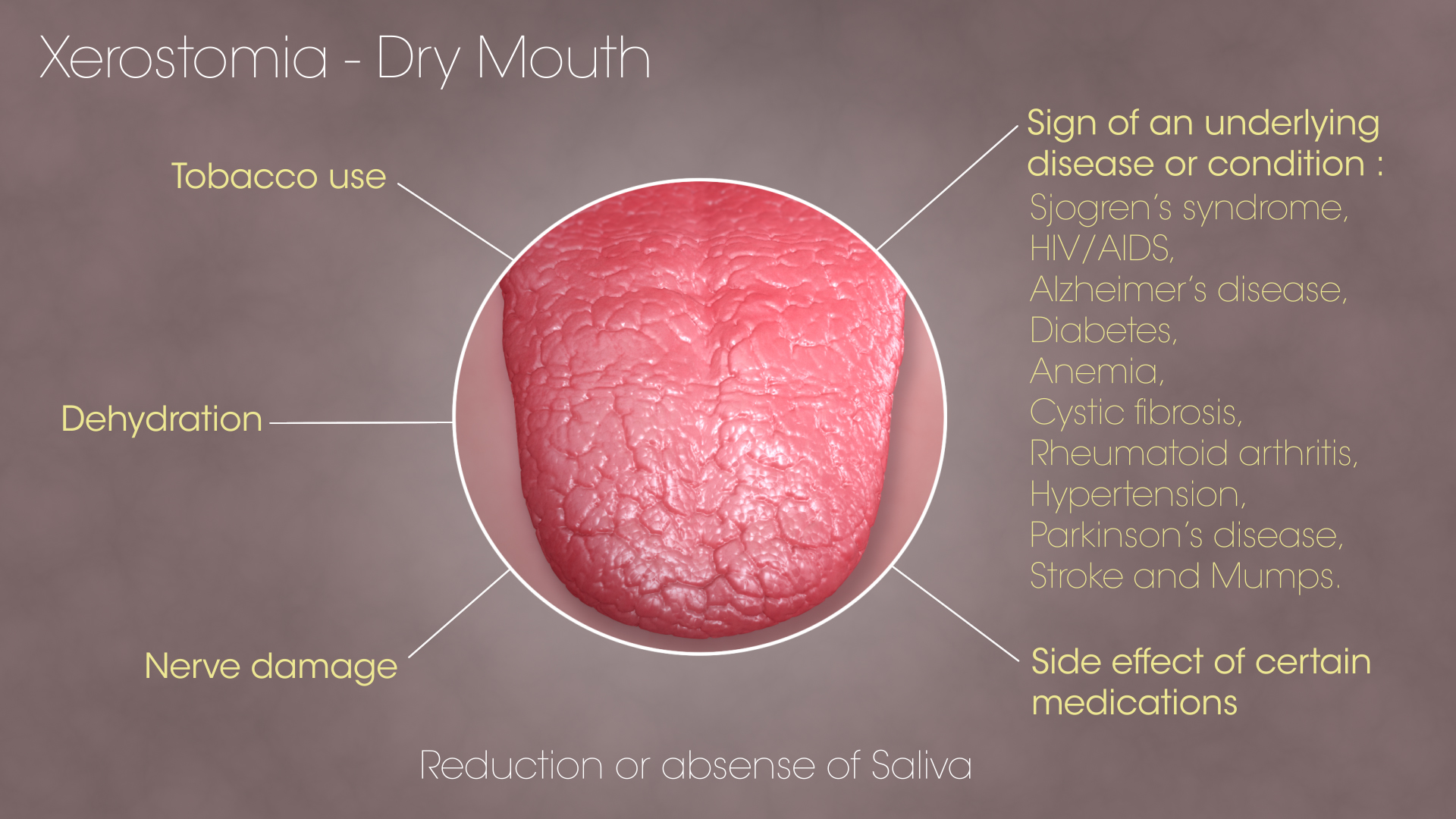Xerostomia, which is also called dry mouth refers to a certain condition where the salivary gland of a person doesn't produce sufficient saliva to keep the mouth wet. Saliva is a viscous, watery and clear fluid secreted by sublingual, submaxillary, parotid, and many other smaller mucous glands of the mouth. Saliva constitutes thiocyanate, immunoglobulins, transferrin, lysozyme, and lactoferrin, they help to maintain a sustainable antimicrobial and antifungal activity, other important functions of saliva is controlling the pH (pH of saliva lies between 6-7.4), cleansing of oral cavity by removal of food particles, lubricating oral cavity, mechanical cleansing, maintaining the integrity of oral mucosa and remineralization.
Symptoms
Few very common symptoms of xerostomia are:
- Cheilitis, fissuring of lips or inflammations
- Fissuring or cracking or oral mucosa and inner lining of the mouth and lips.
- Dysgeusia also called taste disorder.
- Painful tongue also known as glossodynia
- Need for more water especially during the night
- Inflammation or ulcer on the tongue
- Lipstick sticking to teeth
- Frequent gum disease
- Speaking problems
- Problem in swallowing or chewing dry and crumbly foods
- Sore throat
- Salivary gland infection like sialadenitis
- Problem like denture sores and denture retention
- Sticky saliva
- Oral fungal infections like thrush
- Bad breath
Causes
Xerostomia is caused mainly because of:
Medications - Some 42 drug categories and 56 subcategories can be classified as xerogenic drugs, exact numbers can be more than 400 commonly used drugs can cause xerostomia. The few most common drugs category is causing this are antihistamines, antidepressants, anticholinergics, analgesics, bronchodilators, antidiarrheals, skeletal muscle relaxants, anti-anxiety agents, antipsychotics, antiparkinsonian agents, sedatives, antihypertensives, antiemetics and many more.
Aging - Sometimes age also plays an important role in xerostomia, few contributing factors can be the body's inability to process medication, insufficient nutrition, long term health problems and prolonged use of few medications.
Nerve Damage - Nerve damage caused because of any injury or surgery in the neck or head area may also result in this disease.
Other health conditions - Certain health conditions such as yeast infections (thrush) in the mouth, stroke, Alzheimer's disease, diabetes, or autoimmune diseases such as HIV/AIDS, Sjogren's syndrome may also be the reason for this. Breathing with your mouth open or snoring can also contribute to dry mouth.
Lifestyle - Alcohol intake, excessive smoking, usage of tobacco can also enhance the dry mouth symptoms. Sometimes taking recreational drugs may cause severe dry mouth and damage teeth this condition is also known as "meth mouth".
Treatment
Dry mouth or xerostomia treatment may depend on several factors such as if the patient is going through certain medications for certain underlying conditions or diseases. If it is found that dry mouth is being cost because of certain medications, then steps have to be taken to reduce its effect.
Stimulating saliva production can also be a way to cure xerostomia by using drugs. In some cases, the symptomatic treatment of dry mouth usually includes four areas:
· Enhance the flow of saliva
· Replacement of lost secretion
· Control of dental caries
· Undertaking specific measures, as an example of treating infections
A person suffering from xerostomia should take special care of his/her oral hygiene.
An important part of treatment is lifestyle changes where the patient has to completely avoid usage of alcohol drugs or any other intoxicating substance.
Disclaimer: The information in no way constitutes, or should be construed as medical advice. Nor is the above article an endorsement of any research findings discussed in the article an endorsement for any of the source publications.









